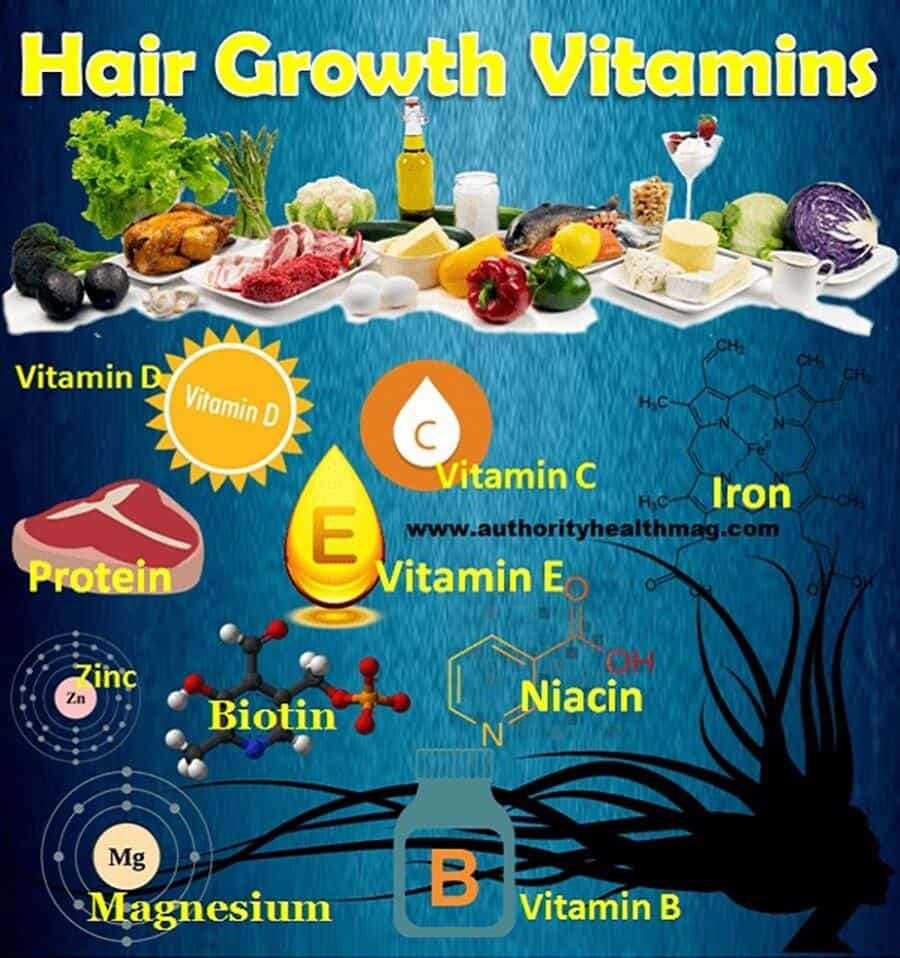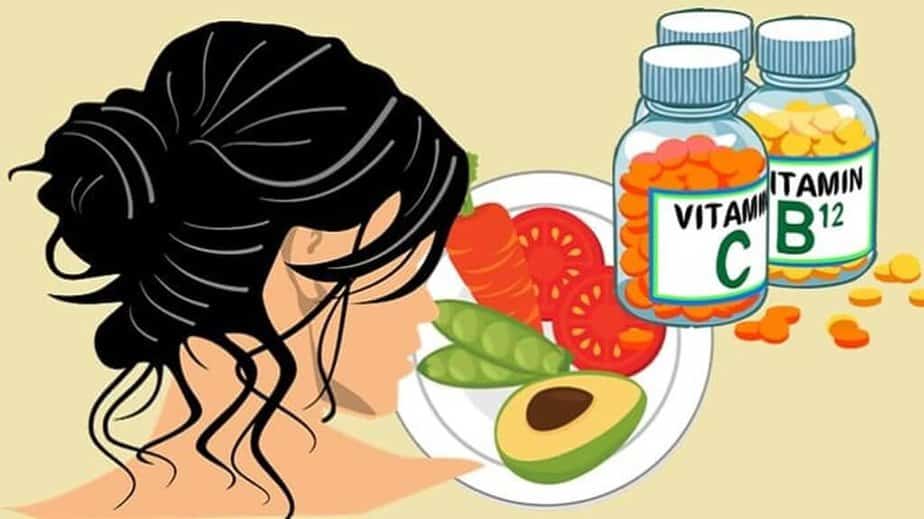Many suffer from excess hair fall, but only a few understand the importance of hair vitamins for the growth and thickening of hair.
If you want to have healthy hair daily, you should eat a well-balanced diet containing all essential vitamins for hair growth.
There are 13 essential hair vitamins necessary for the health of the hair; they include Vitamins E, K, A, D, C, niacin, pantothenic acid, thiamine, riboflavin, Biotin, Vitamin B-12, vitamin B-6, and folate. Among these 13 nutrients, protein, vitamins D and B-Complex (especially niacin and biotin) are essential for hair.
Deficiency in any of the vitamins mentioned above and minerals has the potential to cause poor hair growth and loss.
Let us briefly analyze 10 of the most prominent hair growth vitamins and nutrients.
Vitamin D
Vitamin D is essential for better bones, skin, and hair health.
A 2012 study published in Stem Cells Translational Medicine (SCTM) emphasizes vitamin D as a necessary hair vitamin for creating new follicles.
According to a Harvard study, the absence of vitamin D receptors (VDR) leads to the development of alopecia. Vitamin D, combined with chemicals, reactivates the dormant follicles, resulting in the fresh growth of hair.
An adult person should get 15 micrograms of vitamin D per the Office of Dietary Supplements recommendations under the National Institute of Health.
According to WHO reports, over one billion people worldwide suffer from Vitamin D deficiency.
The best natural sources of Vitamin D are fish, grains, mushrooms, fortified orange juice, and low-fat milk. Exposure to direct sunlight can also help the body produce vitamin D.
The Office of Dietary Supplements warns that consuming vitamin D supplements is NOT healthy as it can build up fat tissues at dangerous levels if consumed in excess. Taking more than the required amount of Vitamin D through supplements can also lead to high calcium levels in the blood, leading to kidney problems and other health hazards.
Vitamin B
The best vitamin for hair growth is the B complex. B Vitamins also regulate metabolism and coordinate the central nervous system. B-complex vitamins rank at the top of the list of best hair vitamins.
The University of Maryland Medical Center (UMM) report recommends B-complex vitamins as essential for healthy hair and skin. This cobalamin (B-12), biotin, and niacin are particularly needed to strengthen hair strands.
The best sources of vitamin B are natural foods like whole grains, avocado, cauliflower, carrots, dark leafy greens, poultry, egg, beef liver, nuts, soybeans, and legumes. Vegetarians who usually experience a deficiency in B-complex vitamins may have to depend on supplements.
Vitamin C
Vitamin C is generally known for its importance in creating a healthy immune system and supplying antioxidants to the body.
One of the common causes of hair loss is vitamin C deficiency. People with deficient levels of Vitamin C in the blood usually have dry and splitting hair, which is easily susceptible to hair fall.
One of the studies by Kim M.K et al., from the Kyungpook National University School of Medicine, Daegu, Korea, found that ‘Ascorbic Acid 2-Phosphate stimulates the growth of dermal papilla cells and promotes the elongation of hair shafts in isolated hair follicles in culture.’
Vitamin C plays a significant role in the synthesis of collagen, which determines skin and hair health.
Vitamin C is required for the maintenance and functional enhancement of tyrosine (amino acid). This amino acid maintains the structural integrity of hair strands and cells of hair follicles.
The antioxidant properties in Vitamin C contribute to the re-growth of hair. It does this by preventing oxidative damage to the cells of hair follicles.
Vitamin E
You should have seen ads on vitamin E supplements and gels that help promote hair growth.
Vitamin E has a significant role in the healthy growth of hair. This vitamin has antioxidants that help to build and repair tissue.
Some studies have established a close association between oxidative stress and alopecia. Most alopecia patients usually exhibit lower levels of antioxidants and a higher lipid peroxidation index. Tocotrienols belong to the vitamin E family and are known to be potent antioxidants.
When applied to the scalp, vitamin E reduces inflammation and repairs damage to the follicles. Through this process, the rejuvenated strands promote hair growth again.
Vitamin E deficiency can lead to bad health, such as dry hair, split ends, and hair fall. The best dietary sources of Vitamin E are green leafy vegetables, sprouts, oils, and nuts.

Iron
Many women and men have iron deficiency (anemia). One of the visible symptoms of iron deficiency is excess hair fall and brittle nails.
Hair loss from iron deficiency occurs because of the low hemoglobin levels in the blood. Hemoglobin is the protein molecule in red blood cells that carries oxygen for the growth and repair of body cells, including the hair follicles.
Temporary hair loss, such as iron deficiency hair loss, is called telogen effluvium.
The best sources of iron minerals are beef, poultry, seafood, beans, dark green leafy vegetables, such as spinach, dried fruit, such as raisins and apricots, and iron-fortified cereals, bread, and pasta.
Magnesium
Magnesium is a critical mineral for hair. Besides hair loss, magnesium deficiency also affects the thyroid, metabolism, heart, nervous, muscular-skeletal, digestive, and more.
Lack of magnesium, especially in women, leads to premature graying of hair, hair thinning, and facial hair growth.
The best dietary sources of magnesium are fermented foods such as yogurt, kefir, sauerkraut and kombucha, pumpkin seeds, spinach, quinoa, millet, wild halibut, almonds, sunflower seeds, and dark chocolate.
Reduce the intake of alcohol and caffeine as they prevent the absorption of magnesium from dietary sources.
You can buy magnesium oil as a spray and apply it every day to the areas of hair loss. It is one of the leading supplements for hair loss. Avoid dying, straightening, or perming your hair until your magnesium level is average.
Protein
You may need more protein if you have dry, brittle, or weak locks. People on a low-protein diet often suffer from severe hair loss.
Protein helps the body produce keratin, the most essential element in your hair structure. The hair strands are more prone to breakage when their keratin content is weak.
According to the USDA, women aged 31-50 should get 5 ounces of protein, and younger women ages 19-30 can have 5 1/2 ounces.
Choose chicken, turkey, fish, dairy products, and eggs as the best high-quality protein sources. The best plant-based protein sources are quinoa, spinach, broccoli, bean sprouts, nuts, etc.
Niacin
Niacin, also known as nicotinic acid or Vitamin B3, plays a massive role in the healthy growth of hair.
It is a water-soluble vitamin that is very much needed for the body to convert food into energy. Extreme fatigue and tiredness are characteristic symptoms of niacin deficiency.
People who take niacin supplements might experience niacin “flush.” This vitamin widens the capillaries, allowing increased circulation of blood flow to all parts of the body, including the hair follicles. However, excess intake of niacin supplements has adverse effects on health.
According to an article published on Add-hair.com, niacin stimulates hair growth and minimizes the accumulation of cholesterol under the scalp. The cholesterol build-up on the scalp is dangerous as it is converted into enzyme five alpha-reductase that causes alopecia.
Shrimp, fish, lean red meat, dairy, beans, almonds, carrots, and celery are all rich in niacin.
Biotin
Recently, there has been a lot of publicity on biotin supplements for hair growth, one of the hair supplements in high demand now.
Biotin, also called vitamin H, is part of the B-complex vitamin.
Few of the past studies have reported that deficiency in biotin results in hair breakage, hair loss, and cracked and brittle nails. It is assumed that eating biotin-rich foods or taking biotin hair growth pills would help increase hair growth and stop hair fall.
Biotin is naturally present in foods such as halibut, Swiss chard, liver and kidney, eggs, dairy, wheat, carrots, nuts, soy, vegetables, fruits, beans, and mushrooms.
Zinc
Zinc is a trace element in the human body; without this, many biochemical processes in the body will be affected partially or fully.
Zinc is an essential mineral for healthy hair, nails, and skin and a nutrient for growth.
Interestingly, zinc deficiency in the body is caused by defects of Vitamin A and D. The prominent and most visible sign of zinc deficiency is hair loss.
Zinc is necessary for building healthy cells, regulating hormones, and helping absorb other vitamins and minerals.
Many dermatologists liberally recommend zinc supplements for hair growth and the prevention of hair fall.
According to researchers, zinc deficiency causes deterioration of the protein structure that makes up the hair follicle. Weakened follicles will result in hair fall and stunted growth.
The trace minerals in the body are essential for the production of DNA and RNA, which are required to multiply hair follicles, leading to better hair growth.
Some studies suggest the efficacy of zinc pyrithione in eliminating dandruff on the scalp.
Zinc, iron, and magnesium are significant ingredients in most hair growth treatments.
